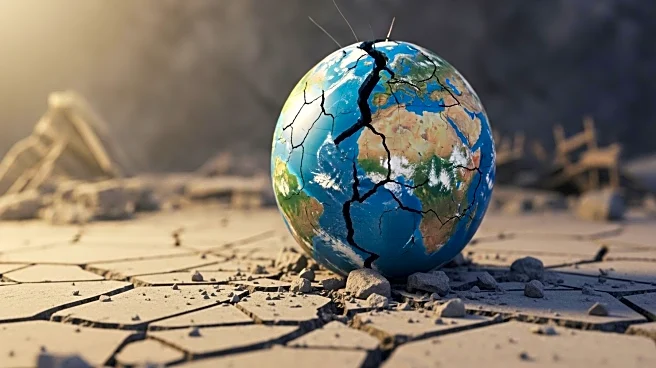What's Happening?
A magnitude-6.1 earthquake struck the easternmost region of Papua in Indonesia, causing scattered damage in the coastal town of Nabire. According to Suharyanto, the chief of the National Disaster Mitigation Agency, the earthquake led to the collapse of at least two houses and the main bridge in Nabire. Additionally, a government office, a church, and an airport sustained minor damage. Despite the structural impacts, no casualties have been reported. The U.S. Geological Survey confirmed the earthquake's epicenter was located 28 kilometers south of Nabire at a depth of 10 kilometers. The Indonesian Meteorology, Climatology, and Geophysical Agency assured that there was no tsunami threat as the quake was centered inland. The region has a history of seismic activity, with previous deadly earthquakes occurring in 2004.
Why It's Important?
The earthquake highlights the vulnerability of Indonesia, a nation situated on major seismic faults, to natural disasters. Frequent earthquakes and volcanic eruptions pose significant risks to infrastructure and human safety. The recent quake underscores the need for robust disaster preparedness and response strategies in the region. The absence of casualties in this incident may reflect effective emergency protocols, but the structural damage indicates ongoing challenges in building resilience against such natural events. The economic implications are also notable, as damage to infrastructure like bridges and airports can disrupt local economies and necessitate costly repairs.
What's Next?
Authorities are likely to conduct further assessments to determine the full extent of the damage and prioritize repair efforts. The focus will be on restoring communication networks and infrastructure to ensure the safety and connectivity of affected communities. The government may also review and enhance current disaster preparedness measures to mitigate future risks. International aid and support could be sought to assist in recovery efforts, especially if the damage is extensive.
Beyond the Headlines
This event may prompt discussions on the long-term strategies needed to enhance Indonesia's resilience to natural disasters. The ethical considerations of development in high-risk areas could be revisited, emphasizing sustainable building practices and community education on disaster response. Additionally, the cultural impact on local communities, who may face displacement or loss of heritage sites, should be considered in recovery plans.









